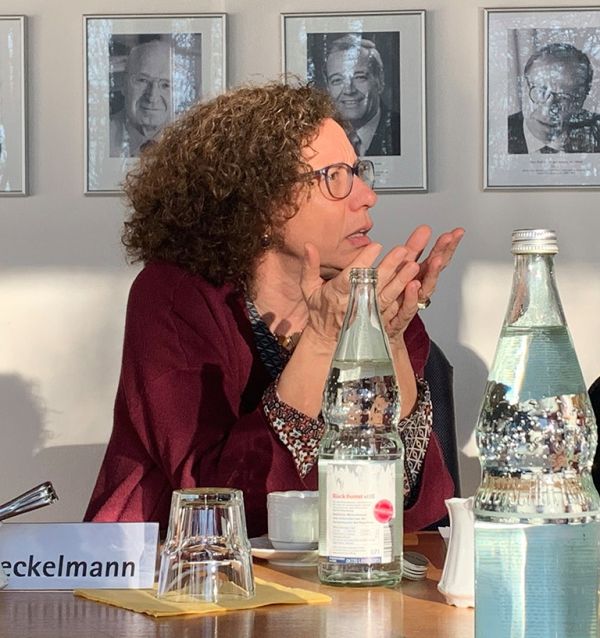Lorenza Violini
Professor in Constitutional Law – University of Milan
Professor Lorenza Violini is Full Professor in Constitutional Law at the University of Milan. She is a Member of the Academic Senate of the University of Milan, and of the Research Ethics and Integrity Committee of the National Research Council (CNR). Within the University of Milan, she teaches Diritto Costituzionale within the Law Master Degree program, Giustizia Costituzionale Comparata within the Law Master Degree program and the Juridical Sciences Bachelor Degree program, and Global Constitutional Law within the L.L.M. in Law and Sustainable Development. She is also a member of the board of the latter and of the Ph.D. in International Public Law, Ethics and Economics for Sustainable Development. She also teaches the Advanced Course in “Diritto e Valutazioni scientifiche”.
Since July 2019, Professor Violini has chaired the CRC I-WE, coordinating 10 different Departments within the University of Milan, ranging from bio-chemical to environmental sciences and from law to agriculture, with the aim to promote technological innovation directed to public health, food security and sustainable development. CRC’s mission is to foster comprehensive and holistic research (with an integrated approach) in technological improvements in the fields of healthcare, fair access to food and water, human rights, climate change, health and big data, nutrition and healthcare/law/markets, behavioural mass spectrology, food safety and security. The CRC acts as a control room for law-and-science research and as a meeting point for stakeholders.
Professor Violini has been elected twice as Director of the Department of Italian and Supranational Public Law, one of the three branches of the Milan University Law School. She therefore managed and promoted scientific research, performed by both individuals and groups related to the Department, in the fields of knowledge it covers. Among the Department’s main research lines, the national and supranational legal protection of the rights of individuals and groups has a pivotal role. These rights are examined from a procedural and a substantial viewpoint and particular attention is devoted to the equal enforcement by the relevant Judiciary. Under her second mandate, in 2018, the Department has been awarded with the grant MUR “Dipartimenti di Eccellenza”, thanks to the project “Law, Justice and Sustainable Development”.
Lorenza Violini has authored hundreds of scientific publications; among these, many are relevant to the topics of the project and can be divided into three research streams related to the Novel Food challenge: science and law, sustainability, and European integration.
The first and most relevant line concerns the relationship between law and science and the regulation of scientifically disputed fields. These topics were firstly addressed in her monograph of 1986, “Le questioni scientifiche controverse nel procedimento amministrativo”, Milano, and, afterwards, they have been developed in various writings. They are: “Sui contrasti tra valutazioni giuridiche e valutazioni scientifiche nella qualificazione della fattispecie normativa: la Corte compone il dissidio ma non innova l’approccio”, (Giur. Cost., 1998); “La tutela della salute e i limiti al potere di legiferare: sull’incostituzionalità di una legge regionale che vieta specifici interventi terapeutici senza adeguata istruttoria tecnico-scientifica”, (Le Regioni, 2002); “Tra scienza e diritto: i nodi irrisolti della fecondazione medicalmente assistita”, (in AA.VV., La procreazione medicalmente assistita: al margine di una legge controversa, 2004); “A reasonable
settlement of a disputed issue: the Italian Legislative Act n. 40/2004 on medically assisted procreation.” (Journal Of Medicine And The Person, 2005); I diritti fondamentali e il loro futuro: il banco di prova del biodiritto, (in ID., I nuovi diritti dell’uomo, 2012); Alla ricerca dello statuto costituzionale degli embrioni crioconservati (with B. Vimercati), (Quaderni di scienza&vita, 2013); La Corte e l’eterologa: i diritti enunciati e gli argomenti addotti a sostegno della decisione, (Osservatorio Costituzionale, 2014).
The second group of publications explores the topic of sustainability under a legal point of view. Among them is the book Il diritto all’acqua (edited with B. Randazzo), Milano, 2017; and the following articles: Protezione della salute e dell’ambiente “ad ogni costo” (Giur. Cost., 1990); Policy per la sostenibilità (in Ritorno al futuro: Note sulla sostenibilità by M. Carvelli, G. Vittadini, 2020); The need for a multidisciplinary approach to face challenges related to food, health, and sustainability: The contribution of CRC I-WE (with D. Martini, G. Ragone et al., in Sustainability,2021).
The third stream deals with the relations between national and supranational legal systems and includes the following works: The Fragmented Landscape of Fundamental Rights Protection in Europe: the Role of Judicial and Non-Judicial Actors (edited with A. Baraggia, Cheltenhalm, 2018); Le norme generali sulla partecipazione dell’Italia al processo normativo dell’Unione europea e sulle procedure di esecuzione degli obblighi comunitari. Commento alla legge 4 febbraio 2005 n. 11, (Le Regioni, 2005); Le preoccupazioni dell’Europa rispetto alla libertà dal bisogno materiale dei suoi cittadini, (Nonprofit, 2005); La dimensione europea dei diritti di libertà: politiche europee e case law nel settore della tutela dei diritti fondamentali: sviluppi recenti, (federalismi.it, 2012); The impact of the Charter of fundamental rights on European Union policies and legislation, (in Making the Charter of fundamental rights a living instrument, 2015).
She has obtained renowned research grants and has coordinated various national and international projects (among the others, she was co-PI of the project “Academic Freedom Under Pressure?” financed in 2019 by the German DAAD). Professor Violini has relationship and made research in prestigious American Universities: above all, she is permanent fellow of the Center for Ethics and Culture and of the Kellog Institute, Notre Dame University of Indiana. She has been hosted as a guest lecturer by many important European Universities.

